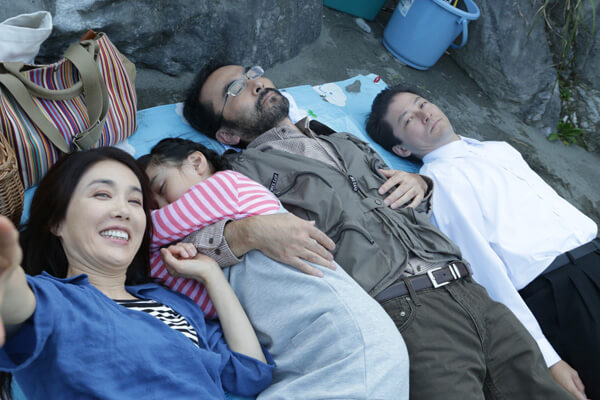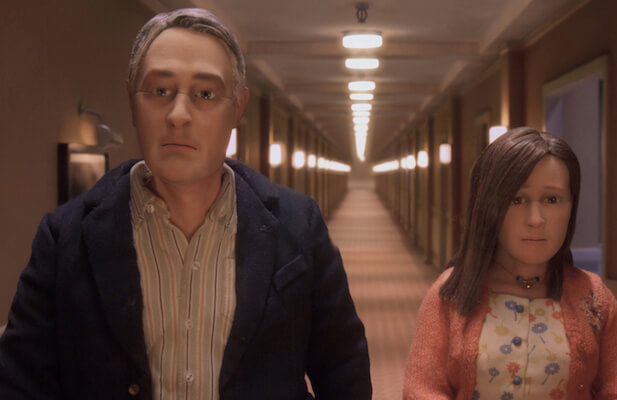ERICKSON her phoenix.jpgJoaquin Phoenix in Spike Jonze’s “Her.” | WARNER BROS.
BY STEVE ERICKSON | Of the films made about the dangers of the Internet, the best is Kiyoshi Kurosawa’s 2001 “Pulse.” It’s also the most elliptical and enigmatic — the hardest to boil down into a cautionary tale for parents. Spike Jonze’s “Her” takes a seemingly ludicrous premise — a man (Joaquin Phoenix) falls in love with his computer’s operating system (the voice of Scarlett Johansson) — and runs with it.
Thanks to trashy TV shows like “Strange Sex” and “My Crazy Obsession,” we know that some people have already fallen in love with sex dolls and robots, even without artificial intelligence. Also, an increasing number of people spend all their waking hours online, a point brought home when a woman at my screening of “Her” decided it would be a good idea to simultaneously watch the film and browse Facebook. Jonze’s film is science fiction, but the sort whose concerns are so contemporary that one wonders how it will look in 10 or 20 years.
In a spiffed up LA, Joaquin Phoenix ventures way out on the emotional frontier
The press kit describes the setting of “Her” as the “slight future,” but something has happened to rid LA of most of its cars. It focuses on Theodore (Phoenix), who’s recovering from a divorce that’s being finalized. At work, he writes beautifully eloquent love letters for other people, printed out in fake handwriting. After seeing an ad for a new operating system powered by artificial intelligence, he buys it. Loading it in, he discovers it has a voice. “She” dubs herself Samantha. Samantha is incredibly smart and, as he quickly finds out, flirtatious. As odd as it seems, Theodore and Samantha fall in love and even figure out how to have sex with each other.
An imaginative amount of world-building went into “Her.” It envisions a Los Angeles that’s closer to New York, although the Pudong District in Shanghai was the actual inspiration. The city is free of smog and traffic congestion. Instead of driving, almost everyone rides the subway. You can even ride the train to the beach. Additionally, Theodore plays holographic video games in his apartment, where their foul-mouthed characters interact with Samantha.
On the downside, “Her” looks like a film shot in high-definition video five years ago, before DCP became obligatory and the technology improved. The lighting seems too bright, with blown-out white backgrounds. One wonders if cinematographer Hoyte Van Hoytema was trying to hide the real look of contemporary Los Angeles. Jonze’s many music videos have shown off his range as a director, but in “Her,” as in his 1999 debut “Being John Malkovich,” he seems to be deliberately holding himself back and shying away from beautiful images. A friend theorized that he wants the film to look like it was shot through an Instagram filter.
Samantha starts off in danger of becoming a Manic Pixie Dream OS. After all, computers are built to serve people. Although she doesn’t have a body, she risks being another version of the “pleasure units” from “Blade Runner,” with the added bonus of being genuinely smitten with Theodore. However, as Samantha and Theodore’s relationship develops, it evolves past the honeymoon stage. She starts to make demands of him. When the couple tries to have physical sex, via a complicated and ill-conceived three-way, it’s her idea and he’s reluctant to carry through with it. Her desires set the stage for the ending.
To its credit, “Her” doesn’t offer up the standard near-future dystopia. The film’s world seems no worse than the present. If anything, it’s cleaner and more pleasant, if equally lonely. In contemporary science fiction cinema, such optimism is almost unheard of. “Her” may suggest that it’s better for Theodore to connect with human women than Samantha, but it doesn’t demonize technology. It refrains from making any grand, obvious statements about how the Internet has made us both more connected and more alienated. After all, “Her” is as much about consumerism as technology itself. However, its ending does show the challenge of finding a conclusion to such an oddball story, and the results are only partly satisfying. Still, as he did in 1999, Jonze has his finger on the zeitgeist.
HER | Directed by Spike Jonze | Warner Bros. | Opens Dec. 20 citywide



































